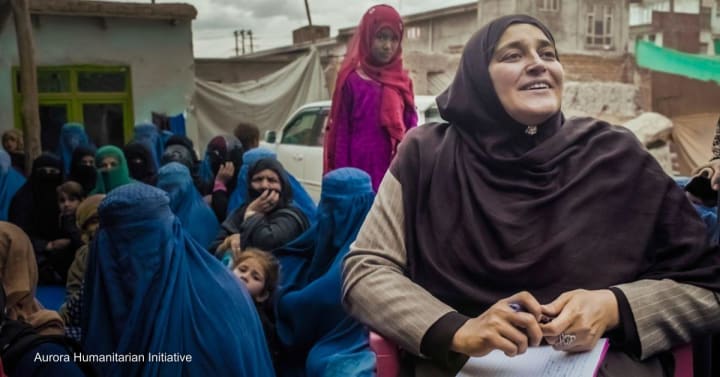
As many Armenians do, I grew up with stories of how my family survived the genocide. Luck played a role, but so did courage, and not just their own: two German soldiers building the Berlin-Baghdad railway in the region pulled my great-grandfather Bedros and his brother Nerses off of a train headed to all but certain death in the desert. We live with a debt of gratitude to those long-gone soldiers who risked their own lives to save others, enabling my family to exist today.
Gratitude is a powerful feeling and one that can, and should, spur action. This is the core principle of the Aurora Humanitarian Initiative, a global philanthropic organization that I lead. Since its founding in 2015, Aurora has driven local impact by supporting grassroots humanitarian leaders who save and improve the lives of others. We do this in gratitude to those who stood up for and saved Armenians 100 years ago.
Global philanthropy is shifting and, in many cases, embracing more localized funds. Many organizations, including Aurora, have channeled this by supporting on-the-ground humanitarians. This approach doesn’t just consult or consider the people impacted by violent atrocities and other humanitarian crises; instead, it engages and empowers these communities. Still, there’s a gap between leading humanitarian organizations’ intent to drive localization and the reality — which lags behind, sometimes significantly. The lessons we’ve learned over the past nine years of operation shed some light on the challenges associated with going truly local.
Key lessons learned
Our experience supporting local humanitarians has taught us several key lessons about grappling with the complexities of global humanitarian response. Among them, localization can be complicated, but even so, philanthropy and NGOs are not moving fast enough. Direct funding to local actors and national nonstate actors remained between 1.7% and 3.7% from 2012 to 2022, rising to just 4.6% in 2023, the United Nations Office for the Coordination of Humanitarian Affairs shared in its 2023 Humanitarians Risks and Trends report. Local leaders are uniquely positioned to confront skyrocketing and unprecedented humanitarian emergencies and they need more support. A record 114 million people have been displaced as of 2023, which doesn’t account for the rising displacement numbers since then in areas such as Sudan, Gaza, and other areas of the world. Nearly 300 million people are in need of aid, according to the OCHA’s 2024 Global Humanitarian Review.
On May 8-10, leading humanitarians will come together to discuss the world’s most pressing humanitarian issues and announce the 2024 Aurora Prize laureate in Los Angeles.
To learn more and register for the events, click here.
Having experienced displacement six different times, our most recent Aurora Prize laureate, Jamila Afghani, knows the plight of refugees all too well. Afghani, an Afghan educator, and human rights defender, continues to provide education for more girls and women against the odds. She sees a better life for her daughters and her people. “I believe education is like a candle,” she said in a video at the 2023 Innovate Philanthropy Symposium in Boston, “It can reduce the darkness and light up many other candles around it.” International aid groups must persist in elevating local humanitarians as leaders who represent the best of humanity.
For all the darkness in the world, we are fortunate to have so many points of light, like Jamila. It’s our job to amplify their stories and impact to, as Jamila says, counteract the darkness and spark further light. Here are five lessons from Aurora’s first nine years in operation:
1. We know investments in modern-day heroes pay off. When we met Dr. Tom Catena, he had been serving as the only surgeon permanently based in Sudan’s remote and war-torn Nuba Mountains for over a decade. His Mother of Mercy Hospital served 750,000 people spanning an area the size of Austria. According to our data, Aurora funding has supported medicine to treat over 200,000 patients and helped build momentum for further fundraising and program development in 2017-2018. After a period of relative peace, Catena and the Mother of Mercy Hospital are once more caught in the crossfire of today’s humanitarian “perfect storm” in Sudan. As of mid-April 2024, an astonishing 8.2 million people have been displaced as a result of the conflict in Sudan since the same time last year, where civil war has resulted in thousands of civilians killed and children conscripted.
Some of the largest and most respected foundations in the world recognize the impact of supporting local organizations. When the Ford Foundation announced in October that it would provide grants to both Palestinian- and Jewish-led efforts in Gaza, the foundation’s president, Darren Walker, reflected on upholding local humanitarians in moments of peril, stating: “We are supporting those closest, most proximate, to the people and communities in greatest need.”
2. Funders need nonprofits to create a seamless process to find people and programs worthy of support. We know that funders want to have impact, but it’s challenging to surface these modern-day heroes. Our prize selection process solves this by bringing in many nominees for consideration. Our most recent cycle took in 700 nominees, adding to a cumulative 4,100 nominations from 144 countries and territories. These local laureates are then able to direct the prize money where it’s needed.
3. Leaning into collective expertise bolsters accountability. We believe that those on the ground are the best positioned to determine how funding can be most effectively allocated. That does not preclude accounting for impact, crucial in any model of support. At Aurora, we take on most of that work ourselves, performing multiple rounds of due diligence through the prize’s selection process, which includes reviews from our expert panel of nonprofit leaders and humanitarian practitioners and then our selection committee, comprised of former heads of state, Nobel Peace Prize laureates, and leaders from business and academia. This rigor builds trust without burdening the humanitarians, who are the scarce and precious resource in a world facing so many overlapping and escalating crises.

4. Getting money into war-torn countries and unstable political environments takes persistence and partnership. This is an ongoing challenge we and all those seeking to have local impact face. Working with each year’s laureate brings new learnings. For example, in 2020, we were trying to transfer a $50,000 grant to Huda Al-Sarari, a Yemeni human rights lawyer. She became a target of the Houthis during Yemen's tumultuous civil war and sought refuge in Oman. She was without permanent residency and therefore ineligible to open a bank account. Reprieve, a U.K.-based ally in human rights advocacy that has investigated killings in Yemen, stepped in to steward the funds to her. Just before they did so, Al-Sarari’s status in Oman stabilized, allowing her to finally open a bank account and receive funds directly. Organizations need to work together and share creative solutions to help those who are embedded in communities, serving as beacons of hope.
A call to prioritize and amplify action
Back in Belemedik, the town where the German soldiers outfitted my ancestors with uniforms and jobs, my great-grandfather and his brother became a bookkeeper and a supply manager. They saved Armenians from passing trains as often as possible but felt terrible knowing that those they could not save were going to die. You don’t need to be directly descended from this type of atrocity to understand that humanitarians engage in this work at great personal cost. As global needs escalate, the call to action is clear: We must prioritize and amplify the work of these humanitarian heroes. Their bravery and selflessness in the face of adversity can inspire a cycle of gratitude, laying the foundation for a more humane and responsive global aid system. I invite you to join us in this mission, helping to ensure that the best of humanity shines through, even, and especially in what feels like, some of our darkest hours.
Each April 24, we commemorate the Armenian Genocide Remembrance Day. As a global community, we must take action to prevent history repeating itself. Learn more about supporting humanitarians and preventing a second Armenian genocide here.




